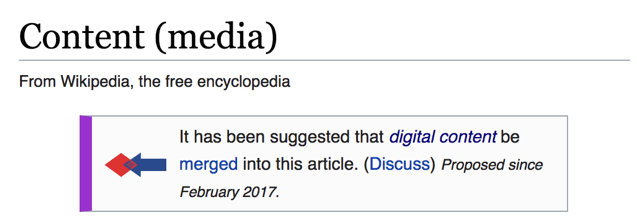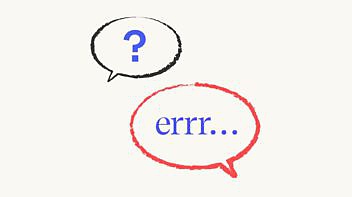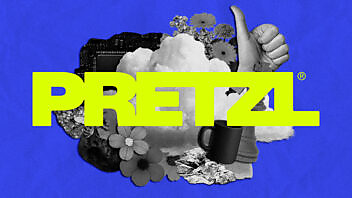[Ethel] Hey, where are you working these days?
[Me] I work for a Digital B2B Content Agency.
Her eyes glaze over. A glint of fear creeps in.
[Ethel] It must be one of these internet jobs. I’m not going to understand the next few words out of his mouth.
This is the standard reaction I get when I tell people what I do for a living. So I start to unpack the terms:
Digital – stuff that lives on the internet
B2B – as opposed to business to consumer
Agency – an organization that provides a service
Those are the easy ones.
How do you explain content?
Take 1
[Me] You know, it’s the material you find on the internet.
[Ethel] So, you write memes?
[Me] Definitely not.
You know, it’s the material you find on the internet that companies push out.
[Ethel] Brochures, you write brochures.
[Me] No, not exactly
–
I’m in the business of communicating things. This shouldn’t be this hard.
–
Take 2
[Me] You know, like a report, an infographic or some videos…
[Ethel] You work for Gartner.
(facepalm)
–
I realise my audience has probably experienced ‘content’ before and so will inherently ‘get it’. I just have to jog their memory.
–
Take 3
[Me] Did you read that article in the Guardian on Palm Oil the other week sponsored by the RSPO? That’s content.
[Ethel] You’re a journalist?
[Me] We can all dream, can’t we…
–
Naturally, I go to the web for help.
But even the Oxford English Dictionary struggles with it.
–
Take 4
[OeD] Noun. Information made available by a website or other electronic medium.
[Ethel] So, you’re a web designer?
[Me] Noooooooo!
–
Even before I start reading it, Wikipedia tells me it doesn’t know what it’s talking about.

–
I phone a friend.
–
Take 5
[Geoff] Information that addresses people’s interests and concerns? Something that tells a story? Piques interest?
Definitely use piques.
[Me] Hmmm, piques…
That’s getting closer. But it still doesn’t feel quite right.
So I decided to have a go myself…and realized something important.
When you define content, you’re also defining its fundamental purpose. That’s why this is so hard to do – every marketer is going to need their content to do at least one of three different things:
Inform – it needs to contain information (data, insight, opinion, visuals) that’s valuable to a given audience.
Explain – it needs to help an audience understand something.
Educate – it needs to show an audience how to improve.
(and Market, of course – it needs to demonstrate why they should buy from you. Or at least be part of a strategy that does.)
But there’s still something missing.
So, if content needs to inform, explain or educate, it is defined by its substance. To bastardize Marshall McLuhan, content is the message in the medium.
To really understand what content is, I decided to consider what good content looks like.
Well, earning a click and keeping someone there certainly indicates success to some degree.
And getting them to share it.
And interact with it.
Clearly, someone releasing well-researched, proprietary data can often be construed as good substance.
Exclusive access to an expert’s thoughts, especially if they’re candid, usually resonates.
Something that’s entertaining.
Something that solves a real problem.
A unique look at the future.
The simplification of something complex.
The explanation of something that actually isn’t so simple.
The problem is that I’m still falling into the trap I fell into earlier. I’m using examples. I’m assuming my audience – you – know what good content looks like. I’m appealing to my assumed experience you have with content.
And that’s the thing. I can’t tell you what good content looks like. I can’t give you one formula that always achieves good content.
But you can.
That’s because, I don’t decide whether something has substance. My audience does.
–
Epilogue
[Ethel] Hey, where are you working these days?
[Me] I work for a Digital B2B Content Agency.
Her eyes glaze over. A glint of fear creeps in.
[Me] ‘We create the substance in media that piques the interest of a targeted audience.’
[Ethel] So you put together the stuff on the internet that I click on?
[Me] Well…
* “The story you are about to read is true. Only the names have been changed to protect the innocent.”

Enjoyed this article?
Take part in the discussion








Comments
scott ivell salesforce July 23rd, 2018
‘substance in media’ sounds so BS though…
how about ‘We create informative and educational stories that piques the interest of a targeted audience’?
Haley Garner July 26th, 2018
haha, I don’t disagree on your first line, but is content always a story? Is it always educational? And in saying it is, we’re treading closely to medium rather than message.
Thanks for the comment!
Martha Gallagher Access Information Management August 15th, 2018
We used to call content “information” – it still works I think.
Claire Grantham Velocity Partners August 15th, 2018
LMAO. My parents tell people that ‘I work for those companies who send you stuff you don’t want or didn’t ask for…’ Nice way to sum up my 24 year career.
Haley Garner August 17th, 2018
Thanks for the comment @Martha!
The thing is that information isn’t necessarily content. A company’s SEC filing, a dictionary entry, a contact-us page, there’s a whole lot of things out there that are information – but not content.
I’d also say there is content that doesn’t contain information. An instagram post, pieces written to entertain, etc.
Sharyn Inzunza Rivet Writing September 18th, 2020
“Mum, when you go to a company’s website, there are words, right? I write those.”
“Oh, okay. Like the Apple website? Did you write those words?”
“I wish.”
“That’s okay, Love. There aren’t many words on that website. anyway. There’s nothing to really read! You’d do a much better job..”
“Right….”
[Should I explain the magnificence of pared-down, specific copy?”]
“Cuppa tea, Mum?”
Haley Garner Velocity September 23rd, 2020
Hahaha fantastic!
Doug Kessler September 28th, 2020
One step at a time. Soon she’ll be asking about A/B Testing.